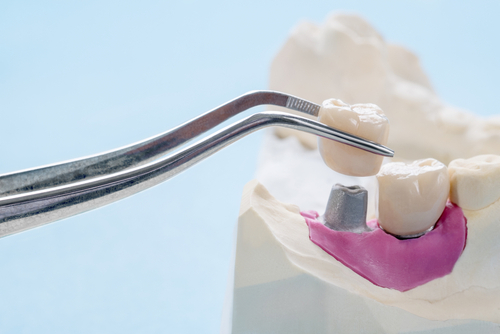Losing a tooth can impact your confidence. Dental implants provide you with a replacement that looks and feels natural. Dental implants not only restore your smile but also maintain jawbone strength, allowing you to eat with confidence.
What Makes Dental Implants Unique?
Dental implants are a superior solution for missing teeth as they replace the entire tooth, from root to crown. This unique feature provides more benefits than just enhancing your smile. Acting as an anchor, implants offer strong support for replacement teeth and prevent bone loss.
How Do Dental Implants Work?
Dental implant surgery is a step-by-step process where an implant is placed in your jawbone. Osseointegration helps it bond with your jawbone, followed by adding an abutment for the custom-made crown to match your natural teeth.
The Advantages of Choosing Dental Implants
Choosing dental implants benefits long-term oral health and overall well-being by providing superior stability, aesthetics, and function compared to other options. They allow you to eat freely, speak clearly, and smile confidently, enhancing your quality of life while also maintaining jawbone health for a youthful appearance.
Natural Look and Feel
Dental implants match your natural teeth in color, shape, and size, blending seamlessly. They provide comfort by securely fitting into your jawbone, allowing you to eat, speak, and laugh confidently. Improve your quality of life with a healthy and beautiful smile through dental implants.
Durability and Longevity
When replacing a tooth, consider the longevity of the solution. Dental implants made to last a lifetime with proper care. The titanium implant fuses with the bone of the jaw for stability, allowing for long-term use. While the crown or bridge may need replacement over time, the implant can endure for decades or even a lifetime.
Preservation of Jawbone Health
Losing a tooth leads to jawbone loss due to lack of stimulation from chewing. Dental implants replace the whole tooth, stimulating the jawbone to prevent bone loss and maintain facial structure for a youthful appearance.
Dental Implants vs. Other Tooth Replacement Options
Dental implants offer advantages over dentures and bridges. Dentures can move around and may feel uncomfortable. In contrast, dental implants stay in place, giving you a strong and permanent fit. This makes it easy to eat, talk, and smile confidently.
Also, unlike dental bridges that change nearby healthy teeth, dental implants do not affect them. They keep your natural teeth safe and sound.
Comparing Implants to Dentures
While removable dentures can help with missing teeth, they are not always comfortable or stable. They often click or slip when you talk or eat. Plus, they need messy adhesives to stay in place. Dental implants, however, work just like your natural teeth. They let you eat more types of food and speak clearly.
Why Choose Implants Over Bridges?
Dental bridges require support from nearby teeth and may weaken them. Implants stand alone in the jawbone, preserving natural tooth structure. Bridges last 7 to 10 years; with proper care, implants can last a lifetime.
The Process of Getting Dental Implants
Getting dental implants starts with a visit to your dentist. They will check your oral health and talk about your goals. Then, they will make a treatment plan just for you. This way, you know what’s happening and can take part in each step.
Initial Consultation and Planning
The journey to a new smile begins with a chat with your dentist. They’ll review your medical and dental history, examine your teeth, gums, and jawbone, and may take X-rays or 3D images. This is the first step in the dental implant process and the time to ask questions, share concerns, and discuss your expectations. Your dental care provider, such as a general dentist or prosthodontist, will create a treatment plan outlining steps, timeline, costs, and any additional procedures needed for a healthier smile.
The Implantation Procedure
Once the treatment plan is ready, the next step is the implantation procedure. This is usually done with local anesthesia to keep you comfortable. Your oral surgeon will make a small cut in your gum to reach the implant site. They will then use special tools to create the right space in your jawbone for the implant, which will serve as the tooth root and stimulate the growth of new bone.
The dental implant is placed in this space to fit securely. After your implant is in place, your gum will be stitched back up to help it heal over the implant. This means the surgical part is done, and now your jawbone will start to connect with the implant.
Recovery and Care Following Surgery
After getting your dental implant surgery, it’s time to heal and ensure everything goes well. Recovery time can differ for each person, but most feel little pain afterward. Your dentist will give you post-surgery instructions, including how to keep your mouth clean, to eat soft foods for a few weeks, and how to manage pain. In about three days, most people can resume normal activities, but it can take several months for your jawbone to fully fuse around the implant through the process of osseointegration. Understanding the recovery and care following dental implant placement surgery is crucial for the long-term success and stability of your dental implant.
Ensuring the Success of Your Dental Implants
Starting the journey to a healthier you is commendable! To ensure the long-term benefits of dental implants, maintain good oral hygiene and attend regular checkups with your dentist. By working together – taking care of your teeth at home and having your dentist monitor your progress – you can keep your implants in excellent condition for years.
Tips for Long-Term Maintenance
Regular care is essential for dental implants, much like natural teeth. Maintain good oral hygiene by brushing twice daily with a soft-bristled toothbrush and fluoride toothpaste. Floss daily to prevent gum issues. While implants don’t develop cavities, gum disease is still a concern. Regular dental checkups are crucial to ensure long-term success. Your dentist will clean and inspect the implants, addressing any issues early on to keep them healthy for years.
Regular Check-Ups and Oral Hygiene
Regular dental checkups are crucial for maintaining healthy dental implants. Visits help dentists monitor implant health, detect damage, and provide cleanings. Good oral hygiene at home is equally important. Brush teeth twice daily with fluoride toothpaste and floss daily to prevent infection and ensure implant success.
Schedule a Consultation Today
If you’re interested in getting a dental implant, Palm Beach Periodontics is here for you. Our team of experts will ensure you get the results you’re looking for at an affordable price. Schedule your consultation today online or by phone.












